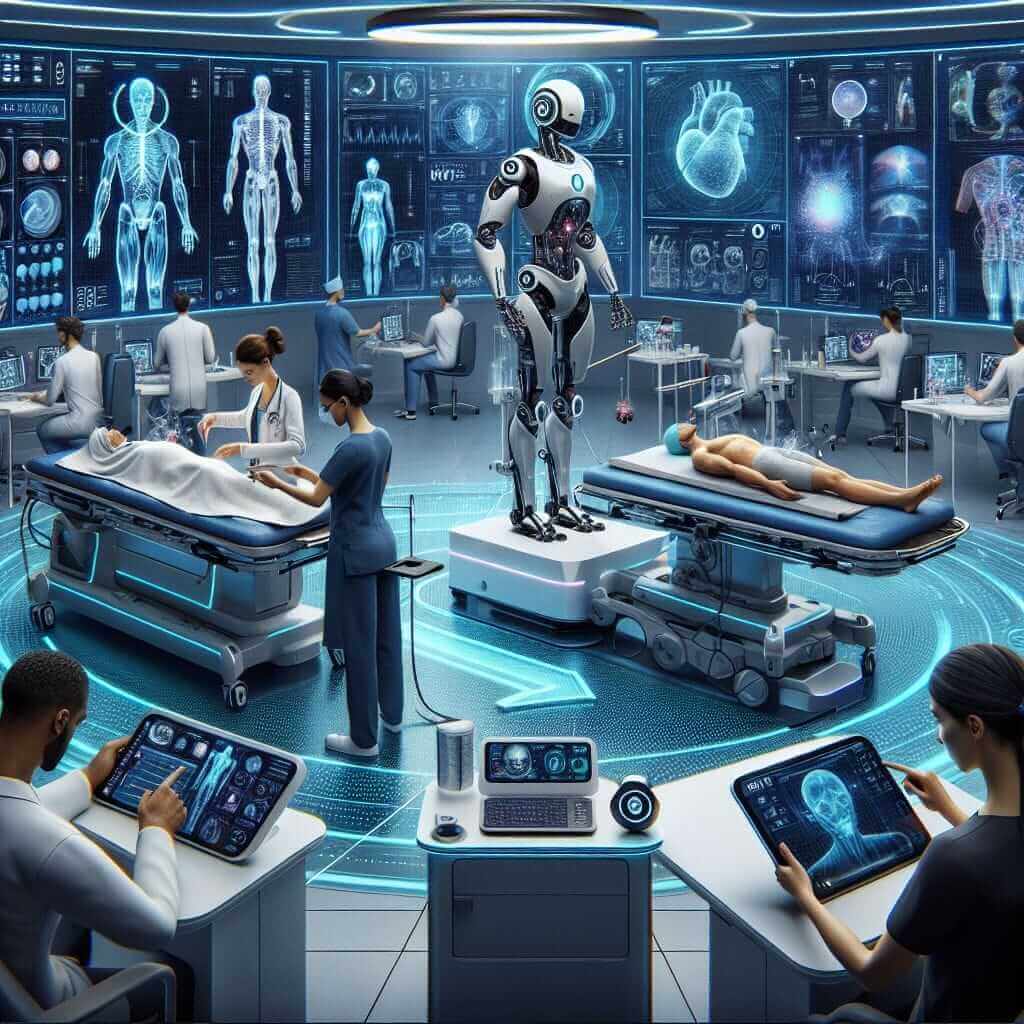The IELTS Reading section is a critical component of the IELTS exam. This section evaluates a candidate’s ability to read and understand a variety of texts, identify main ideas, details, inferences, and implications. Topics can range from science and technology to history and culture. One increasingly relevant and intriguing topic is “How does artificial intelligence affect the healthcare industry?”
Given its rising prominence in today’s world, it’s not surprising if such topics appear in your future IELTS exam. This article provides an in-depth reading practice passage with questions and answers to help you prepare.
Reading Passage: The Impact of Artificial Intelligence on Healthcare
How Does Artificial Intelligence Affect the Healthcare Industry?
Artificial Intelligence (AI) is transforming various sectors, and the healthcare industry is no exception. From streamlining administrative processes to revolutionizing patient care, AI is playing an increasingly pivotal role. This reading passage delves into the numerous ways AI is shaping healthcare and what it means for the future of medical practices.
Artificial intelligence encompasses a broad range of technologies, including machine learning, natural language processing, and robotics. In healthcare, AI applications are multifaceted. For instance, AI-powered diagnostic tools can analyze medical images with remarkable precision, often surpassing human capabilities. Moreover, AI algorithms can predict patient outcomes based on historical data, enabling personalized treatment plans.
The integration of AI in healthcare administration is simplifying complex tasks. Electronic Health Records (EHRs) management, patient scheduling, and billing processes are becoming more efficient and error-free with the aid of AI. The use of chatbots and virtual health assistants is also gaining traction, providing patients with immediate medical advice and support.
However, the implementation of AI in healthcare is not without challenges. Data privacy concerns are paramount, as patient information must be safeguarded against breaches. Additionally, there is resistance from medical professionals who fear that AI might replace human jobs. Nevertheless, the consensus is that AI will augment rather than replace healthcare providers by performing routine tasks, allowing them to focus more on patient care.
Looking ahead, AI’s role in healthcare will likely expand. Emerging technologies like predictive analytics and robotic surgeries promise to enhance medical outcomes further. While AI adoption is still in its infancy, its potential to revolutionize healthcare is undeniable.

IELTS Reading Questions
Multiple Choice Questions
-
What is one significant advantage of AI-powered diagnostic tools mentioned in the passage?
a. They are cheaper than traditional methods.
b. They can analyze medical images with remarkable precision.
c. They are easier to use by all medical professionals.
d. They don’t require any patient data. -
How is AI transforming administrative tasks in healthcare?
a. By eliminating the need for medical professionals.
b. By simplifying complex tasks like EHR management.
c. By increasing the number of healthcare administrative staff.
d. By making all administrative tasks fully automated without supervision. -
What is one challenge in implementing AI in healthcare?
a. The high cost of AI technologies.
b. The reluctance of patients to share data.
c. Concerns about data privacy.
d. Lack of AI knowledge among administrative staff.
True/False/Not Given
-
AI is expected to replace healthcare providers in the near future. (True/False/Not Given)
-
Predictive analytics is one of the emerging technologies in AI that can enhance medical outcomes. (True/False/Not Given)
-
AI has already eliminated the need for human intervention in robotic surgeries. (True/False/Not Given)
Answer Key
Multiple Choice Answers
- b. They can analyze medical images with remarkable precision.
- b. By simplifying complex tasks like EHR management.
- c. Concerns about data privacy.
True/False/Not Given Answers
- False.
- True.
- Not Given.
Common Mistakes to Avoid
- Misinterpreting questions: Always read the questions carefully. For instance, a question asking about the future roles of AI shouldn’t be answered based on current data.
- Ignoring specific details: Ensure to focus on specific details like technologies mentioned (e.g., predictive analytics, robotic surgeries) and their current or potential impacts.
- Confusing similar options in multiple-choice questions: Carefully distinguish between options that may seem similar but have different contexts or implications.
Vocabulary
- Encompass (verb) /ɪnˈkʌmpəs/: to include different types of things.
- Example: The project will encompass AI technology in various sectors.
- Augment (verb) /ɔːɡˈment/: to increase the value, amount, effectiveness, etc. of something.
- Example: AI can augment the capabilities of healthcare professionals.
- Precise (adjective) /prɪˈsaɪs/: exact and accurate.
- Example: The AI diagnostic tool provides precise results.
Grammar Point
Relative Clauses:
- Usage: To give additional information about a noun in the main clause.
- Example: “AI algorithms can predict patient outcomes based on historical data, which enables personalized treatment plans.”
- Which refers to the action that precedes it, adding information about how AI algorithms work.
Tips for High IELTS Reading Scores
- Practice Regularly: Consistency in practice can significantly improve your reading speed and comprehension.
- Expand Vocabulary: Building a strong vocabulary will help in understanding complex texts better.
- Skimming and Scanning: Learn to skim for general ideas and scan for specific information to enhance efficiency.
- Time Management: Practice managing your time effectively. Allocate your time according to the length and difficulty of the text.
- Understand Question Types: Familiarize yourself with different question types in the IELTS Reading section.
By understanding how artificial intelligence affects the healthcare industry, you are not only preparing for the IELTS Reading section but also staying informed about relevant scientific advancements. Happy studying!